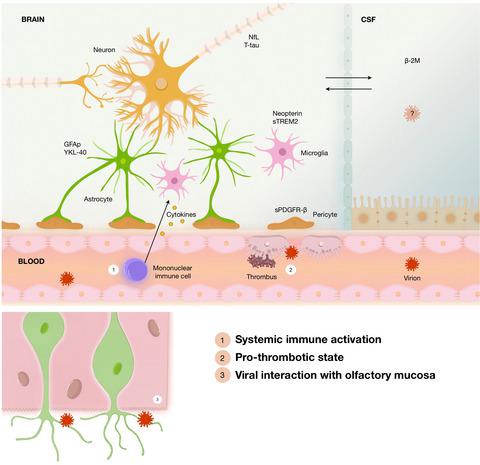当前位置:
X-MOL 学术
›
J. Neurochem.
›
论文详情
Our official English website, www.x-mol.net, welcomes your
feedback! (Note: you will need to create a separate account there.)
Neurochemical biomarkers to study CNS effects of COVID-19: A narrative review and synthesis
Journal of Neurochemistry ( IF 4.2 ) Pub Date : 2021-06-25 , DOI: 10.1111/jnc.15459 Arvid Edén 1, 2 , Joel Simrén 3, 4 , Richard W Price 5 , Henrik Zetterberg 3, 4, 6, 7 , Magnus Gisslén 1, 2
Journal of Neurochemistry ( IF 4.2 ) Pub Date : 2021-06-25 , DOI: 10.1111/jnc.15459 Arvid Edén 1, 2 , Joel Simrén 3, 4 , Richard W Price 5 , Henrik Zetterberg 3, 4, 6, 7 , Magnus Gisslén 1, 2
Affiliation

|
Neurological symptoms are frequently reported in patients suffering from COVID-19. Common CNS-related symptoms include anosmia, caused by viral interaction with either neurons or supporting cells in nasal olfactory tissues. Diffuse encephalopathy is the most common sign of CNS dysfunction, which likely results from the CNS consequences of the systemic inflammatory syndrome associated with severe COVID-19. Additionally, microvascular injuries and thromboembolic events likely contribute to the neurologic impact of acute COVID-19. These observations are supported by evidence of CNS immune activation in cerebrospinal fluid (CSF) and in autopsy tissue, along with the detection of microvascular injuries in both pathological and neuroimaging studies. The frequent occurrence of thromboembolic events in patients with COVID-19 has generated different hypotheses, among which viral interaction with perivascular cells is particularly attractive, yet unproven. A distinguishing feature of CSF findings in SARS-CoV-2 infection is that clinical signs characteristic of neurotropic viral infections (CSF pleocytosis and blood–brain barrier injury) are mild or absent. Moreover, virus detection in CSF is rare and often of uncertain significance. In this review, we provide an overview of the neurological impact that occurs in the acute phase of COVID-19, and the role of CSF biomarkers in the clinical management and research to better treat and understand the disease. In addition to aiding as diagnostic and prognostic tools during acute infection, the use of comprehensive and well-characterized CSF and blood biomarkers will be vital in understanding the potential impact on the CNS in the rapidly increasing number of individuals recovering from COVID-19.
中文翻译:

研究 COVID-19 对中枢神经系统影响的神经化学生物标志物:叙述性回顾和综合
患有 COVID-19 的患者经常报告神经系统症状。常见的中枢神经系统相关症状包括嗅觉丧失,这是由病毒与鼻嗅组织中的神经元或支持细胞相互作用引起的。弥漫性脑病是 CNS 功能障碍的最常见体征,这可能是由与严重 COVID-19 相关的全身炎症综合征的 CNS 后果引起的。此外,微血管损伤和血栓栓塞事件可能会导致急性 COVID-19 对神经系统的影响。这些观察得到脑脊液 (CSF) 和尸检组织中 CNS 免疫激活的证据的支持,以及在病理和神经影像学研究中检测到微血管损伤。COVID-19患者血栓栓塞事件的频繁发生产生了不同的假设,其中病毒与血管周围细胞的相互作用特别有吸引力,但尚未得到证实。SARS-CoV-2 感染中脑脊液发现的一个显着特征是嗜神经病毒感染的临床症状(脑脊液细胞增多和血脑屏障损伤)轻微或不存在。此外,脑脊液中的病毒检测很少见,而且通常意义不明。在这篇综述中,我们概述了 COVID-19 急性期发生的神经系统影响,以及 CSF 生物标志物在临床管理和研究中的作用,以更好地治疗和了解这种疾病。除了在急性感染期间作为诊断和预后工具提供帮助外,
更新日期:2021-06-25
中文翻译:

研究 COVID-19 对中枢神经系统影响的神经化学生物标志物:叙述性回顾和综合
患有 COVID-19 的患者经常报告神经系统症状。常见的中枢神经系统相关症状包括嗅觉丧失,这是由病毒与鼻嗅组织中的神经元或支持细胞相互作用引起的。弥漫性脑病是 CNS 功能障碍的最常见体征,这可能是由与严重 COVID-19 相关的全身炎症综合征的 CNS 后果引起的。此外,微血管损伤和血栓栓塞事件可能会导致急性 COVID-19 对神经系统的影响。这些观察得到脑脊液 (CSF) 和尸检组织中 CNS 免疫激活的证据的支持,以及在病理和神经影像学研究中检测到微血管损伤。COVID-19患者血栓栓塞事件的频繁发生产生了不同的假设,其中病毒与血管周围细胞的相互作用特别有吸引力,但尚未得到证实。SARS-CoV-2 感染中脑脊液发现的一个显着特征是嗜神经病毒感染的临床症状(脑脊液细胞增多和血脑屏障损伤)轻微或不存在。此外,脑脊液中的病毒检测很少见,而且通常意义不明。在这篇综述中,我们概述了 COVID-19 急性期发生的神经系统影响,以及 CSF 生物标志物在临床管理和研究中的作用,以更好地治疗和了解这种疾病。除了在急性感染期间作为诊断和预后工具提供帮助外,











































 京公网安备 11010802027423号
京公网安备 11010802027423号